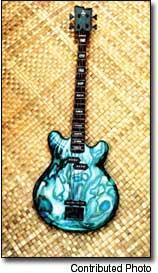John N. “Jack” Tucker, president of Tucker Guitars in Hanalei, is building what he says are some of the world’s best — and most unique — electric guitars. They’re so unique, he figures, that he obtained a patent on the
John N. “Jack” Tucker, president of Tucker Guitars in Hanalei, is building what he says are some of the world’s best — and most unique — electric guitars.
They’re so unique, he figures, that he obtained a patent on the material in 1998 — a patent that promises to make his albizzia-wood electric guitars the talk of the music world, and put Kaua‘i on the rock ‘n’ roll map.
“Albizzia wood is the world’s fastest-growing tree,” says Tucker. “It’s one of Mother Nature’s most premium hardwoods, and it’s just dripping with tone.”
Albizzia, which Tucker says isn’t indigenous to Kaua‘i, today inhabits the Garden Isle’s rainforests and lowlands. But it has such a weak root structure that it’s literally torn apart in high winds.
Still, it makes for lightweight, sweet-toned guitars, Tucker says.
“Naturally air-drying albizzia greatly increases stability,” he says. “The ultimate solid-body electric guitar is achieved by using albizzia for the guitar and bass bodies, instead of mahogany, ash or basswood.”
A finished albizzia guitar or bass is 25 percent lighter in overall weight than current products available in the marketplace, Tucker says.
Why lightweight? Because it’s all about balance, Tucker says.
“Using the lighter albizzia bodies, we can demonstrate how guitars and basses can be made more balanced by equally distributing the weight of the instrument between the neck and body,” he said.
Tucker got into guitar-making full time after Hurricane ‘Iniki demolished his career as a real-estate professional in 1992.
“It’s pretty hard to sell houses with no roofs,” he says. After the hurricane, he noticed all this wood laying around and, as his then-hobby required, he began playing with the mountains of albizzia left behind by the storm.
Today, from his shop in Hanalei, Tucker works full-time to hone his albizzia wood guitars to streamlined perfection. Later, they’re painted by rock drummer Prairie Prince.
Yes, that’s a real person and a real name. Prince is, after all, the drummer for the 1980s rock group The Tubes. When Prince is finished, the instruments are glazed in surprising shades and unconventional, kaleidoscopic colors.
When put up for sale, they command $1,200 to $4,750.
“Right now, all our stuff is on the Internet,” he says. They’ve got 17 for sale right now, and more on the way.
It’s taken 12 years of development to bring the albizzia guitar to the market, Tucker says. Today, Tucker and his partner, John Morrall, are the sole proprietors of both the material and the method. Anyone can make an albizzia guitar overseas, he says, but can’t sell it in the U.S. without facing a lawsuit.
“A great amount of detail goes into selecting and preparing premium albizzia tone woods and forming individually crafted instruments,” Morrall said. “This process insures increased primary tone and resonance from the electric guitar or bass body.”
In other words, they’ve put a lot of time and thought into a product that promises to put Kaua‘i on the electric guitar-making map. For more information, please see www.tuckerguitars.com.
Phil Hayworth, business editor, may be reached at 245-3681 (ext. 251) or phayworth@pulitzer.net.


